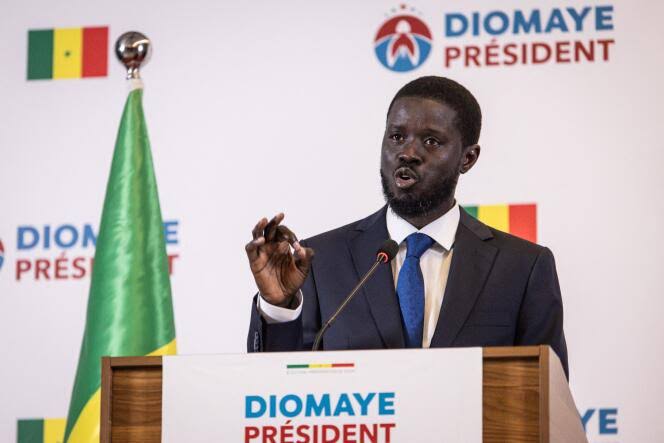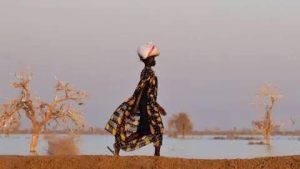
Senegal’s Election and its Implications for Africa
Bassirou Diomaye Faye’s unexpected victory in Senegal’s presidential election has garnered attention not only within the country but also across the African continent. At 44 years old, Faye’s ascent to the presidency marks a significant milestone in Senegal’s political history and carries implications for the future of democracy in Africa.
Before his triumph in the recent election, Faye’s political journey was characterized by perseverance and resilience. Despite facing setbacks in his earlier bid for the mayoral seat of Ndiaganiao, Faye remained committed to his vision of positive change for Senegal. His ability to connect with voters, particularly the youth demographic, played a crucial role in his electoral success.
Faye’s victory represents a departure from the political establishment that has dominated Senegalese politics for decades. His campaign focused on addressing the pressing issues facing the country, including unemployment, poverty, and corruption. By championing transparency and accountability, Faye captured the hearts and minds of voters who were disillusioned with the status quo.
Faye’s victory represents a departure from the political establishment that has dominated Senegalese politics for decades. His campaign focused on addressing the pressing issues facing the country, including unemployment, poverty, and corruption. By championing transparency and accountability, Faye captured the hearts and minds of voters who were disillusioned with the status quo.
The implications of Faye’s victory extend beyond Senegal’s borders. In a continent where democratic transitions are often marred by instability and unrest, Faye’s peaceful rise to power offers a beacon of hope. His commitment to democratic values and inclusive governance serves as a model for other African nations striving to strengthen their democratic institutions.
As Senegal’s youngest elected president, Faye faces numerous challenges on the road ahead. The country’s economy, while relatively stable, remains vulnerable to external shocks, including fluctuations in global commodity prices. Faye’s administration will need to prioritize economic diversification and investment in key sectors to ensure sustained growth and development.
Additionally, Faye inherits a polarized political landscape marked by divisions and discontent. Bridging these divides and fostering national unity will be essential for advancing his agenda and addressing the country’s most pressing challenges. By reaching out to opposition parties and civil society groups, Faye can build consensus and forge a path towards inclusive governance.
Faye’s victory also carries symbolic significance for Africa’s youth, who represent a significant portion of the continent’s population. As a young leader who rose from relative obscurity to the highest office in the land, Faye embodies the aspirations and dreams of millions of young Africans. His success serves as a reminder that age should not be a barrier to leadership and that young people have a vital role to play in shaping the future of their countries.
As Faye embarks on his tenure as president, he faces a daunting array of challenges that will test his leadership and resolve. Chief among these challenges is the need to stimulate economic growth and create jobs for Senegal’s burgeoning youth population. Unemployment rates, particularly among young people, remain stubbornly high, posing a threat to social stability and economic development.
To address these challenges, Faye has pledged to implement a comprehensive economic reform agenda aimed at fostering entrepreneurship, attracting foreign investment, and promoting sustainable development. Key sectors such as agriculture, manufacturing, and technology will be prioritized for investment, with a focus on creating opportunities for young people and marginalized communities.
In addition to economic challenges, Faye’s administration must also grapple with pressing social and political issues, including ensuring the protection of human rights, promoting gender equality, and strengthening democratic institutions. Senegal’s vibrant civil society and free press play a critical role in holding the government accountable and safeguarding democratic values. Faye’s commitment to upholding the rule of law and respecting fundamental freedoms will be essential for maintaining peace and stability in the country.
Furthermore, Faye faces the daunting task of addressing environmental challenges, including deforestation, desertification, and climate change. Senegal is particularly vulnerable to the impacts of climate change, with rising temperatures and erratic rainfall patterns threatening agricultural productivity and food security. Faye’s administration will need to invest in sustainable land management practices, renewable energy, and climate resilience measures to mitigate these risks and safeguard the well-being of future generations.
On the diplomatic front, Faye’s presidency presents an opportunity to strengthen Senegal’s role as a regional leader and mediator in West Africa. With its history of stability and democratic governance, Senegal is well-positioned to play a constructive role in addressing regional conflicts and promoting peace and security in the region. Faye’s commitment to multilateralism and cooperation will be crucial for advancing Senegal’s interests on the global stage.
In conclusion, Bassirou Diomaye Faye’s victory in Senegal’s presidential election represents a historic moment for the country and the African continent as a whole. As Faye assumes the presidency, he faces a host of challenges that will require vision, leadership, and collaboration to overcome. By prioritizing economic development, social inclusion, and environmental sustainability, Faye has the opportunity to leave a lasting legacy of positive change and prosperity for Senegal and its people. As the youngest elected president in Senegal’s history, Faye embodies the hopes and aspirations of a new generation of African leaders, committed to building a brighter future for their countries and the continent as a whole.
_________________
Dr Brian Reuben has impacted leaders in governments and large organisations from in over 20 countries including the United States of America, United Kingdom, South Africa, Ghana, Kenya, Nigeria, Israel, Egypt, UAE, The Gambia, Nigeria, Canada and India among others as an international business development consultant, strategist, researcher, author, speaker and teacher. He is the Chairman of The Sixteenth Council United Kingdom



